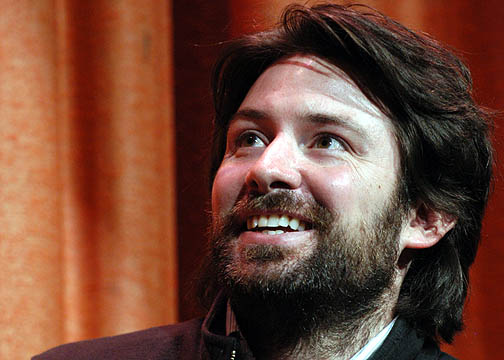CHAMPAIGN – URBANA — Roger Ebert likes to remind filmgoers that this year’s field of best picture Oscar nominees could have been called “the movies that no one wanted to make.”
“Million Dollar Baby,” “The Aviator,” “Ray,” “Sideways” and “Finding Neverland” all hit obstacles en route to the big screen. “After all, no one was clamoring to see these movies made,” said Ebert of the most recent batch of Oscar contenders.
The same might be said of the wide-ranging Overlooked festival field, which included “Murderball” (2005), a documentary about wheelchair rugby; “The Saddest Music in the World” (2003), a primarily black-and-white “semi-musical” set in Winnipeg, Manitoba, during the Depression; “Yesterday” (2004), a human drama about the AIDS epidemic in Africa and the first film ever made in the Zulu language; “Baadasssss!,” a saga about making of the film that ignited the black film movement of the ’70s; “Primer” (2004), a time-shifting science fiction thriller; and “Map Of The Human Heart” (1993), a period romance set largely in the Arctic. The rousing Bollywood musical, “Taal,” which wrapped up the festival Sunday afternoon, was a huge success in India, but has not been widely seen in the U.S.
Appropriately, that theme of “Finding Neverland” — persevering in the face of overwhelming adversity — carried over to Ebert’s own Overlooked Film Festival, which concluded its seventh annual run Sunday here at the historic Virginia Theatre.
Sponsored by the University of Illinois’ College of Communications and programmed by Sun-Times (and RogerEbert.com) film critic Ebert, the festival celebrates movies that were somehow ignored, lost or not widely seen after their original release. Or as Ebert admitted, “We’ve moved into the ‘pre-overlooked’ area, that’s our strategy,” because a few titles shown at this year’s festival, including “Murderball” and “Me and You and Everyone We Know,” have theatrical runs slated ahead.
In any case, Ebert said, it’s “so hard to get a good film made these days, you have to have an unlimited amount of passion.” He cited by way of example director Robert Altman, who couldn’t get a studio film deal for more than a decade.
Veteran indie director John Sayles, whose “The Secret of Roan Inish” (1995) was screened Saturday at the festival, applauded that spirit. Speaking of his film, made with producer and partner Maggie Renzi, Sayles said, “We don’t give up. We succeed because we stick to our own vision.”
Jason Patric, star of “After Dark, My Sweet” (1990), which screened Friday, underscored the necessity of having uncompromised principles. “I don’t work in what the studio system is these days,” he said. “I’m an athlete, I want to play, but I’m not willing to do anything to get there.”
Along with Sayles, Renzi and Patric, other festival guests included actor Jason Scott Lee; directors Guy Maddin, Darrell James Roodt, Mario Van Peebles, Shane Carruth, Vincent Ward Miranda July, and Subhash Ghai; producer Jonathan Sehring, and assorted industry execs, experts and enthusiasts, such as Jean Picker Firstenburg (head of the American Film Institute), the Boston-based Alloy Orchestra, and film critic Jonathan Rosenbaum of the Chicago Reader.
Though stars, directors and industry experts appeared for discussions after every film, perhaps the warmest reception went to real-life athletes Mark Zupan and Joe Soares, who appeared onstage with co-directors Henry Alex Rubin and Dana Adam Shapiro of “Murderball.” “We’re trying to break down the misconceptions of people in chairs,” Zupan said. “We are people just like you are. No one asked to end up in a wheelchair.”
Another emotional moment followed “Baadasssss!,” when Van Peebles received a standing ovation and announced, “I wish my father could be here to see this,” referring to the elder Van Peebles, whose “Sweet Sweetback’s Baadasssss Song” (1971) inspired his movie. And after the “Roan Inish” screening, producer Maggie Rienzi admitted that “John [Sayles] and I held hands and cried, because we’ve never seen our movie projected on a screen this large.”
Down in the crowd, filmgoers applauded the entire OFF experience. Genevieve Kirchman, who lives near Madison, Wis., came last year and returned for more. “I love it, I love it, I love it,” said Kirchman, riffing on the title of Ebert’s book I Hated, Hated, Hated This Movie. “You always see something here that you wouldn’t elsewhere.”
Diane Kennedy of Valencia, Calif., a third-time OFFgoer, said, “It’s a great festival for filmgoers, it’s not an industry event. I’ve been to the Sonoma, Telluride and San Francisco film festivals, but this is my favorite.”
Chuck Boller, executive director of the Hawaii International Film Festival, who came mainly as a fan and not as a participant, said, “I loved every moment. I’m already planning my return trip.”












